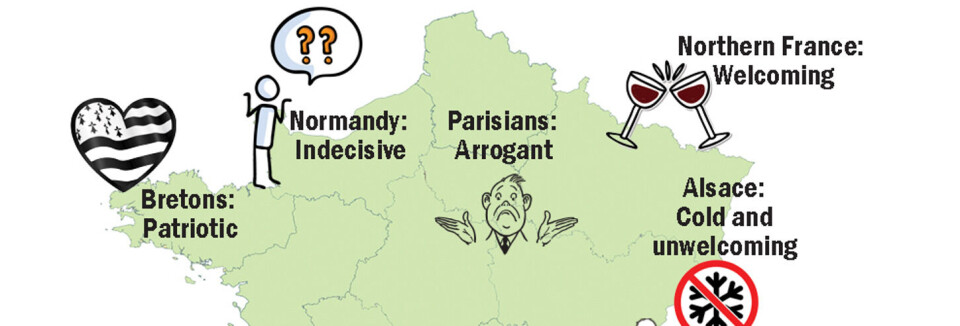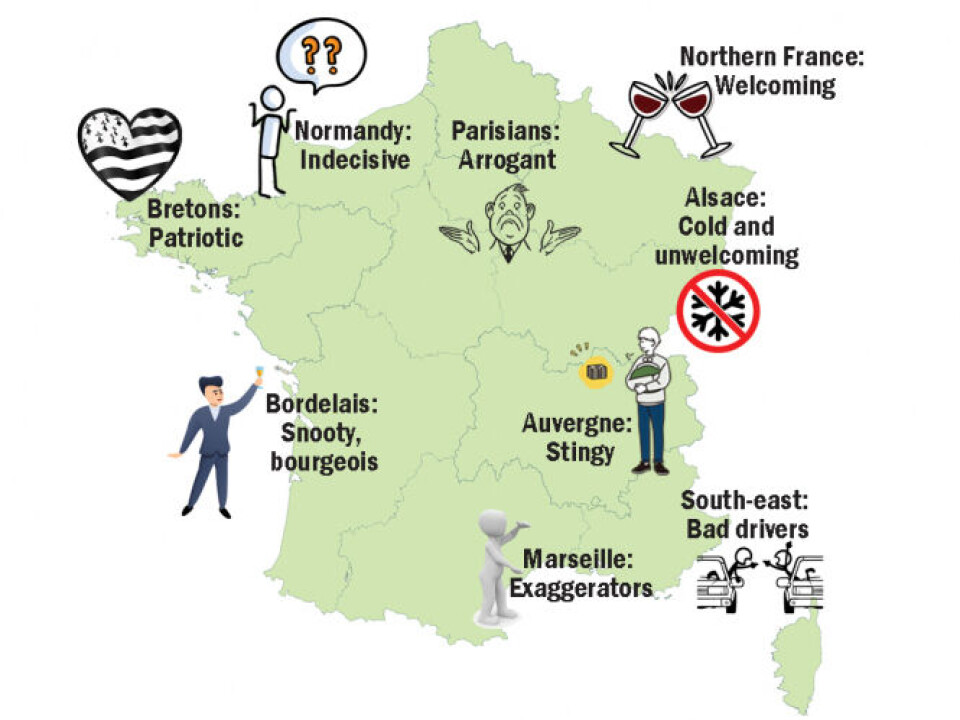-
Fines for driving in central Paris delayed until September
‘Educational period’ to be extended with drivers only cautioned for breaking rules
-
Learning French: Have you ever dreamt in your target language?
From passive listening to active speaking, dreaming in French can indicate you are regularly practicing it
-
Paris pledges action against voyeurs in public swimming pool changing rooms
It comes after several women came forward to report similar sexual assaults
MAP: stubborn Bretons and other regional stereotypes around France
Patriotic, arrogant, like Germans, welcoming, indecisive… we look at the clichés French people use for those from other regions

France is a country of many nuances; diverse in its geography, languages and gastronomie, with people from all corners of the country coming from different cultural backgrounds.
Just as in every country, it carries a bevy of clichés, which, unlike some general stereotypes of France as a nation (baguettes, onion necklaces, and striped shirts) are often very local to people from certain regions.
We look at the clichés within France, often joked about by the French themselves - on a regional, departmental, or even city level.

Northern France
The area - broadly including the Nord and Pas-de-Calais departments - is often seen with negative connotations. French people sometimes joke that people from here are “inbred and alcoholics”.
However, people from Northern France are also known to be extremely welcoming and friendly by nature.
The film Bienvenue Chez les Ch’tis – set in northern France with characters partially speaking in the local Ch’ti dialect – sold more than 20 million cinema tickets in 2008, accounting for about a third of France’s population.
Its success also lies in Dany Boon, a Ch’ti comedian who also directed the movie, giving more credibility and an emphatic tone to the clichés.
Alsace
People from Alsace are often called - or even considered to be - German because of the complex history of conflict between France and Germany over the land.
Often ruled by Germanic princes in the Holy Roman Empire, and at other times by the French, It was part of the German Empire from 1871 to 1918.
The local dialect, Alsatian, is also said to be similar to the German language, and because of their German history, rules in Alsace are slightly different than the rest of France.
One example of this is the celebration of additional religious public holidays that are not celebrated elsewhere in France (for example, December 26, and the Friday before Easter).
Another difference is that schools in the area are permitted to have separate religious classes despite France’s laïcité (secularism) laws preventing this in the rest of the country.
Read more: Laïcité: a bedrock of modern France
Alsatians are also believed to be the exact opposite of people in northern France - i.e not welcoming - as well as cold and direct, much like our stereotype of Germans.
Brittany
People from Brittany are often characterised as stubborn. The personality trait is believed to have been made famous by French writer Gustave Flaubert in his Dictionnaire des idées reçues, an unfinished dictionary book.
Bretons were described as ‘braves gens, mais entêtés’ (a brave but stubborn people).
Similar to other groups in France, Bretons are believed to be very patriotic about their region, and they take pride in a Celtic culture that persists on the peninsula to this day.
It is not uncommon to see a flag from Brittany hovering above crowds at most international cultural or sports events throughout the world, and there are also efforts to revive the use of the local language.
Some Bretons are also nationalists who seek total independence from France, although this represents a low number of people in the region.
More recently, however, there have been increased calls for more autonomy.
Read more: Brittany regional president bids for autonomy in wake of Corsica move
Normandy
The most characteristic personality trait attributed to Normands is their indecisiveness, best exemplified by the sentence ‘p’tet ben qu’oui, p’tet ben qu’non’ (Maybe yes, maybe no).
The origin of the sentence may come from an ancient law in Normandy that gave someone who had just signed a contract the right to go back on their word within the next 24 hours, according to journalist Charles-Henry Groult in an article for La Manche Libre.
‘Une réponse de Normand’ is a French expression that describes someone who has not answered a question in a straightforward manner.
Paris
‘Arrogant’, ‘selfish’, ‘distant’, ‘stressed’, ‘constantly in a bad mood’ and ‘hates tourists’: These are just some of personality traits depicted in the Guide (très) Pratique du Parfait Parisien, a book released in 2018 which described the perfect archetype of a Parisian.
While satirical, the book touches on many traits often highlighted by French people when defining people from Paris.
Many in the rest of France consider the Parisian personality traits - specifically the arrogance and ‘better-than-you’ attitude - to be accurate.
Many people believe they exist because of the centrality Paris occupies in France’s political, economic, and cultural life.
France’s very centralised history has given the impression that everything important in France happens in Paris which - in turn - gives Parisians a feeling of elevation and disdain for anything outside of the city.
For Parisians, anyone who does not live in (sometimes someone who was not even born in) one of the city’s 20 arrondissements is not a ‘Parisian’, even if you live in the bordering suburbs and work in the city.
Additionally, anything that happens outside of the city proper happens in province – a derisory word meaning countryside – and is of little to no importance. Even using the singular word ‘province’ rather than the plural ‘provinces’ suggests that France has only two regions: Paris, and everywhere else.
Bordeaux
The Bordelais are seen as snobs or bourgeois.
“The cliché of the Bordelais boardwalking with boat shoes, chinos rolled up and a little jumper knotted around the shoulders; it exists,” wrote Ouest-France, adding that the cliché is used to describe everyone in the Gironde department, even though it typically only really refers to people who are holidaying in Arcachon.
Bordelais are also perceived as cold and stiff, perhaps due to the effects of the British occupation from 1154 to 1453.
Southern France
People in Southern France have many cliché personality traits. The most commonly known is their propensity to exaggerate, particularly in Marseille.
The trait that has been described with a sentence about a sardine that clogged Marseille’s port: ‘La sardine qui a bouché le port de Marseille’. The phrase suggests that someone from Marseille would exaggerate so much that they would claim a small sardine was enough to block the entire port.
The expression comes from a real event when a ship called La Sartine – which was used by the French army to bring back soldiers captured and liberated by the British in 1780 – became stuck in Marseille’s port.
Successive retellings of the story saw the name Sartine become sardine, so the story became about a fish rather than a boat, which was big enough to block the port.
Although the story is somewhat tongue-in-cheek, it paints a good picture of the general exaggerations that a Marsellais might tell you over a glass of Ricard.
Southern people are also depicted as speaking loudly and often being late to meetings, as well as being bad drivers who use their horn extensively.
Auvergne
Auvergnats are known as pingre (stingy). People from Paris even invented the slang expression ‘faire l’Auvergnat’ (behave like an Auvergnat) to define someone being mean with money.
The mindset is also seen as a result of poverty; poor people who are careful with money because they do not know what tomorrow could bring.
The origin lies in French history, when people from Auvergne migrated to Paris after an agriculture crisis. They first took on jobs as coal miners, before moving to work in bars.
This ‘mean’ cliché, however, has been contradicted many times by several writers, as well as by Georges Brassens, one of France’s most famous singers, who sang in the 1960s about the generosity of Auvergnats.
Credits for map photographs: Haali / Limolida Design Studio / RetroClipArt / art_of_sun / 3D-Man.eu / Toby Bridson / tokumiyanuts / Nsit / Shutterstock
























